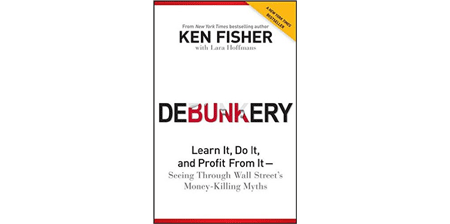In Debunkery, Ken Fisher outlines some of the most common mistakes many (if not all) investors make and provides some guidelines on how to avoid them. From the false belief that bonds are safer than stocks to the equally false belief budget surpluses are good for stocks, Ken Fisher takes a good, hard look at data to debunk 50 investing myths and explains the flawed reasoning behind them.
As Ken Fisher explains, "Let me say this book is not about some 'how-to' system for beating the market. It doesn't have a market-beating formula or even specifically tell you how to invest. If you want a serious primer on overall investing strategy, I refer you to several of my other books. This one is about improving your odds and making fewer mistakes by deploying debunkery."

by Ken Fisher with Lara Hoffmans
John Wiley & Sons, Inc.
October 2010
Hardcover: 240 pages
Ken Fisher, founder and Executive Chairman of Fisher Investments, is a self-made billionaire and ranks among America's wealthiest individuals.
For over 30 years (1984 to 2017), Fisher’s monthly "Portfolio Strategy" column ran in Forbes magazine, making him the longest continuously running columnist in the magazine's history. During this time, he's seen everything from the stock market crash of 1987 and the great bull markets of the 1980s and 1990s to the Tech bubble of 2000 and the global market meltdown of 2008.
Ken Fisher's Debunkery will expose debunkery on 50 of Wall Street’s widely accepted "truths," and details in an easily accessible (and always entertaining) way to help investors side-step some common “mistakes” and make smarter decisions.
Make sure you get your copy of Debunkery today.
de•bun•ker•y
[dih-buhngk-ker-ee]
–noun
1. "Debunkery means unearthing truths, or at the very least, overturning common but widespread and frequently harmful market untruths, myths, and misperceptions most investors fall prey to."
In Ken Fisher’s latest New York Times bestselling book, Debunkery: Learn It, Do It, and Profit From It–Seeing Through Wall Street’s Money-Killing Myths, Ken Fisher demonstrates debunkery on 50 of Wall Street’s widely accepted "truths," and details in an easily accessible (and entertaining) way why:
These are just a few debunkeries Ken Fisher shares in the book to help readers reduce their error rates when it comes to investing.
Additionally, Ken Fisher’s advice will provide you debunkery tactics to help you engage in your own debunkery in your investing career. Some examples: